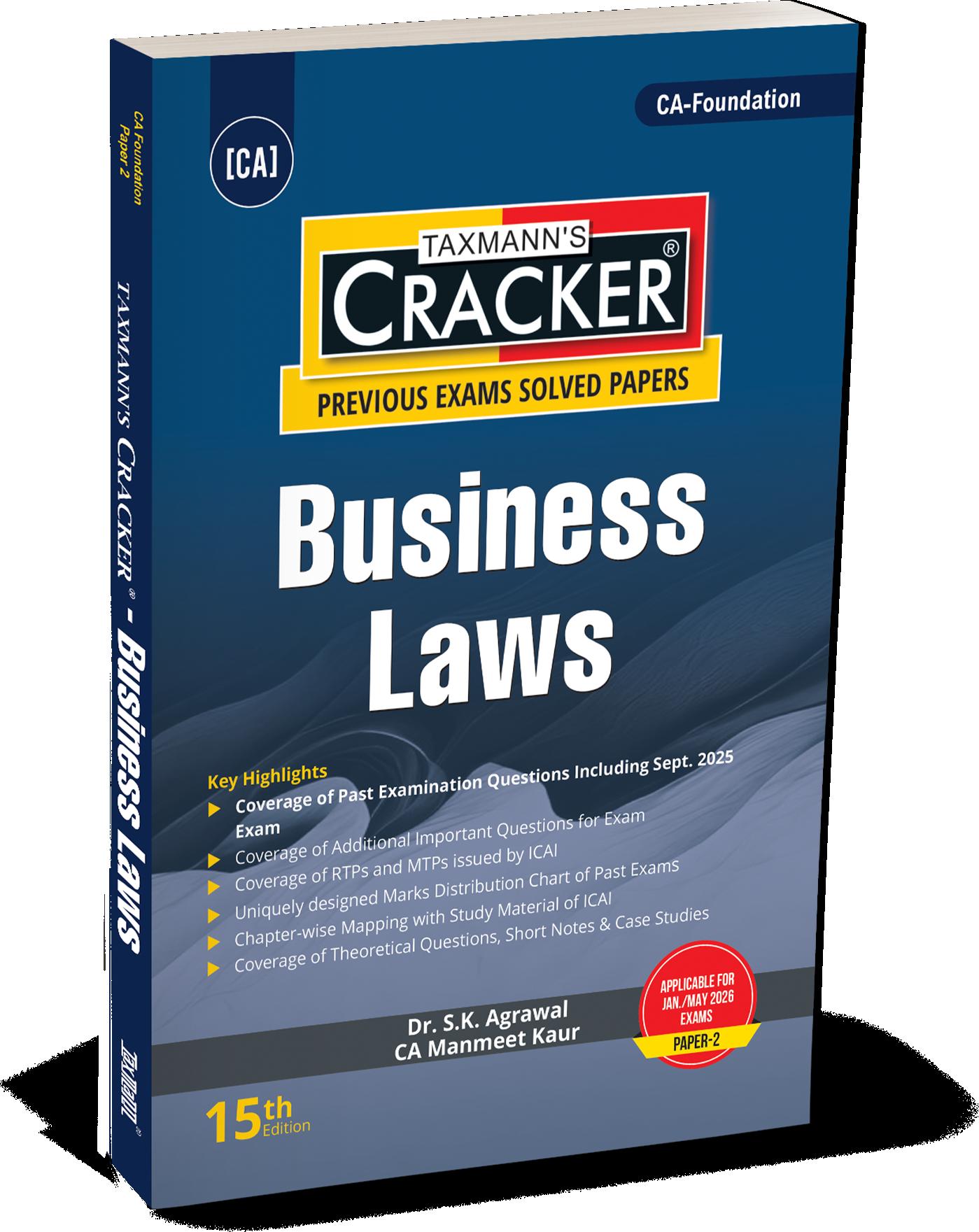NATURE OF CONTRACT
LONG ANSWER QUESTIONS:
Q.1 All contracts are agreements but all agreements are not contracts. Comment.
Ans. As per section 2(h) of the Indian Contract Act, 1872, an agreement enforceable by law is a contract. Thus, an agreement backed by enforceability by law i.e. the intention to create legal relations, is regarded as a contract. An agreement is the pre-requisite for the creation of a contract. Every promise & every set of promises forming consideration for each other is an agreement. Thus, when an offer made by a person is accepted by another, an agreement is said to be created. However, an agreement is a wider term in comparison to contract. It includes even those agreements which are not enforceable since they were not created with an intention of forming legal relations, such as domestic, political or social agreements. However, only those agreements which are enforceable by law are contracts, which in turn depends upon the intention of the parties to create legal relations as well as the presence of the essentials of a valid contract.
Thus, agreement is the genus of which contract is the species & only those agreements are regarded as contracts which create legal relations between the parties.
Q.2 Explain briefly the essentials of a valid contract.
Ans. Section 10 of the Indian Contract Act, provides “all agreements are contracts if they are made by the free consent of parties competent to contract for a lawful consideration and with a lawful object, and are not hereby expressly declared to be void”.
The following are the essentials of a valid contract: Presence of two or more parties
At least two parties are required for the formation of a valid contract.
Offer and acceptance
An agreement is a pre-requisite of a valid contract. An agreement comes into existence when a “valid offer” is “accepted validly”.
Intention to create legal relations
Agreements which do not create legal relations between the parties are not legally enforceable and hence cannot be regarded as contracts. Further, it is the intention of the contracting parties which in turn determines whether or not an agreement results in the creation of legal relations.
Capacity of parties
The parties to an agreement must be competent to contract; otherwise, it cannot be enforced by a court of law. Law presumes that every person is competent to contract, who is (a) of the age of majority, (b) of sound mind and (c) is not disqualified from contracting by any law.
Consensus ad idem or Consent
Consent is required for the formation of a valid contract. The parties are said to consent to the formation of a contract when they agree to the same thing and in the same sense. i.e. they have ‘mutuality of assent’ or ‘unison of minds’.
Free consent
The consent of the parties must be free i.e. the parties should enter into contract voluntarily and on their free will. Section 14 lays down that consent is not free if it is caused by (a) coercion, (b) undue influence, (c) fraud, (d) misrepresentation or (e) mistake.
Lawful consideration
Consideration means “something in return” (quid pro quo). Consideration means something which the promisor receives in return of his promise from the promisee or any other person on his behalf. Consideration may be in cash or in kind but must have some monetary value. It may be in form of some benefit to one party or detriment to another. It may be in form of an act or an abstinence and may be past, present or future. Consideration must be lawful, real and not illusory.
Lawful object
For a contract to be valid it should be made for a lawful object/purpose. The object of an agreement is unlawful in any of the following instances:
- if it is forbidden by law; or
- if it is of such a nature that if permitted it would defeat the provisions of any other law; or
- if it is fraudulent; or
- if it implies injury to the person or property of another; or
- if the court regards it as immoral; or
- if it is opposed to public policy.
Agreement not expressly declared void
A contract to be valid should not be expressly declared as void. The Indian Contract Act, 1872, has expressly declared certain agreements to be not enforceable
by law, e.g. agreements in restraint of marriage, agreements in restraint of trade, wagering agreements etc.
Certainty of meaning
The terms of the contract should be certain, definite and not vague. Section 29 states that “Agreements, the meaning of which is not certain nor capable of being made certain are void.” Thus, a contract to be valid should be certain or capable of being made certain.
Possibility of performance
Another essential feature of a valid contract is that it must be capable of performance. Section 56 lays down that “An agreement to do an act impossible in itself is void.” If the act is impossible in itself, physically or legally, the agreement cannot be enforced at law.
Compliance of legal formalities
According to the Indian Contract Act, a contract may be oral or in writing. An oral contract is as much enforceable as a written contract. However, if there is a provision in any law prescribing that the contract should be in writing or registered or duly stamped, then this formality of writing, registration or stamping should be complied with to make the contract enforceable.
Q.3 “The law of contracts is not the whole law of agreements nor is it the whole law of obligations.” — Comment.
Ans. The law of contracts is not the whole law of agreements as it provides coverage to only those agreements which are enforceable by law. The agreements which are social, domestic or political in nature or made without the intention of creating legal relations are not classified as contracts.
Obligations may arise from different sources. The law of contract deals only with such legal obligations which arise from or have their source in agreements. Obligations which are not contractual in nature are outside the purview of the law of contract. For example, obligations on account of judicial pronouncement, status relationships, torts or under other statutes are not covered under law of contracts. Thus, it is rightly observed: “The law of contracts is not the whole law of agreements, nor is the whole law of obligation. It is the law of those agreements which create obligations and those obligations, which have their source in agreements”.
SHORT QUESTIONS:
Q.4 Differentiate between:—
(a) Void agreements & Void Contracts
(b) Voidable & Void Contracts [June 2023, 5 Marks]
(c) Void Agreements & Illegal Agreements [June 2023, 5 Marks]
Ans. (a)
UNIT II : INDIAN CONTRACT ACT, 1872
S. No. Void Agreements Void Contracts
1. An agreement not enforceable by law is said to be void.
2. It is void right from the beginning i.e., ab initio, since one or more of the essentials of a valid contract are missing.
A contract which ceases to be enforceable by law becomes void when it ceases to be enforceable
It becomes void subsequently. On account of change is law, change in circumstances or on an account of subsequent impossibility of performance.
3. No restitution of bene ts is allowed. Restitution may be granted when the contract is discovered to be void or becomes void.
4. No Compensation is allowed. Part payment for past performance if any, shall be granted. However, no damages shall be awarded.
(b)
S. No. Void contracts
1. A contract which ceases to be enforceable by law becomes void when it ceases to be enforceable.
2. It is valid at the time of formation & remains valid till an event takes place which results in the contract ceasing to be enforceable.
3. A contract becomes void due to change in circumstances, change in law or subsequent impossibility of performance etc.
Voidable contracts
A contract which is enforceable by law at the option of one or more of the parties thereto, but not at the option of the other or others. Thus it is enforceable at the option of the aggrieved party.
It may be voidable right from the beginning or voidable subsequently. It remains valid if the aggrieved party does not elect to avoid it within a reasonable time.
A contract is voidable right from the beginning if consent is caused by coercion, undue in uence, fraud or misrepresentation. A contract becomes voidable subsequently on account of breach of contract or failure to perform the contract at the time xed, if the time is of essence of the contract.
4. Compensation is not payable. The aggrieved party can claim damages for loss sustained by him, if any.
(c) Difference between Void & Illegal agreements
a. Scope : An illegal agreement is one which is formed for an object which is forbidden by law, regarded as immoral or opposed to public policy. While an agreement is void right from the beginning if any of the essentials of a valid contract are missing. Thus, an illegal agreement is narrower in scope than a void agreement. All illegal agreements are void but all void agreements are not necessarily illegal. E.g. an agreement with a minor is void, but not illegal.
b. Collateral Transactions: When an agreement is illegal, other agreements which are incidental or collateral to it are also tainted with illegality,
hence void. However, agreements collateral to a void agreement are not necessarily void.
c. Restitution: In the case of illegal agreement, no right/remedy is available to either party. Hence money paid under an illegal agreement cannot be recovered. Under section 65 if an agreement is discovered to be void any person who has received advantage/bene t must restore it or make compensation for it.
d. Punishment: In case of an illegal agreement the parties may be punished under the criminal law, in case of a void agreement (which is not illegal) there is no such punishment.
Q.5 Write Short Notes on:—
(
a) Unenforceable Contracts
(
b) Quasi Contracts
(
c) Unilateral Contracts
(
d) Bilateral Contracts
Ans. (a) Unenforceable Contract: An unenforceable contract is one, which is good in substance but suffers from some technical defect and therefore cannot be enforced. It is valid in itself, but is not capable of being enforced in a court of law because of non-compliance of some technical formalities such as stamping, registration, attestation etc. Such contracts can be enforced if their technical defects are removed, for example, the defect of under stamping can be removed by affixing the right value of stamps.
(b) Quasi Contract: Quasi Contract is a contract in which there is no intention on the part of either party to make a contract and does not arise out any express or implied agreement. It is a contract imposed by law on the parties and gives rise to obligations similar to those arising under a contract. These are not actual contracts but they resemble a contract which is created by law under certain circumstances. Such a contract may not have all the essentials of a valid contract but the law nevertheless presumes this on the principle of equity which prevents unjust enrichment of a person at the expense of the other. For example; obligation of finder of lost goods to return them or liability of person whom money is paid by mistake to repay it back.
(c) Unilateral Contract: This is a contract in which only one party has to perform his obligation under the contract and the other party has performed his obligation at the time of formation of contract or before. For example: If A buys a railway ticket for his journey from Nagpur to Bombay. A has performed his duty under the contract by paying the fare but the railways are yet to perform their promise i.e. of carrying him from Nagpur to Bombay. Such contracts are also called as contracts with executed consideration or one-sided contracts.
(d) Bilateral Contract: A bilateral contract is one in which both the parties exchange a promise with each other to perform some act in the future. In such a contract, obligations of both the parties are outstanding at the time of forma-
UNIT II : INDIAN CONTRACT ACT, 1872
tion of the contract. It is similar to an executory contract and is also known as a contract with executory consideration.
CASE STUDIES:
Q.6 Lekhpal promises today ` 5 lakhs to his son if the son passes the CA exams. On passing the exams, the son claims the money. Can the son file a suit against the father?
Ans. Hint: No. Because it is a domestic agreement [no intention to create legal relations].
Q.7 X, a coolie in uniform carried Y’s luggage from the railway platform to taxi without being asked by Y to do so. Y does not make any attempt to stop X from carrying the luggage. Is Y bound to make payment to X?
Ans. Hint: Yes [Implied contract : Implied offer & implied acceptance (silence as manifestation of acceptance & acceptance of consideration)].
Q.8 Arun has two cars - one of white colour and another of red colour. He offers to sell one of the cars to Basu thinking that he is selling the car which has white colour. Basu agrees to buy the car thinking that Arun is selling the car which has red colour. Will this agreement becomes a valid contract?
Ans. Hint: No. [Since consensus idem is missing]
Q.9 Mr. W, boards a bus at a bus-stop. He travels for some distance and on arrival at his destination, he makes a move to get off the bus. The conductor stops him and asks for the fare. He denies his duty to pay saying they did not form any contract comment.
Ans. Hint: Implied contract - a contract that can be understood from the conduct of the parties - Mr. W is bound to pay the fare for availing the transportation services.
Q.10 State whether a contract is created in the following cases:—
(i) Mr. R promises to supply 4 teakwood chairs to Mr. S for a price which shall be xed by Mr. F.
(ii) Mr. P promises to pay ` 10 Lacs to Mr. T, if he brings back to life Mr. P’s dead wife.
(iii) A mother promises to give ` 500 to her son, if he accompanies her for shopping.
(iv) Mr. P promises to pay ` 10 Crores to Mr. N if he resigns from his party and joins Mr. P’s political party.
Ans. Hint: (i) A valid contract is created - The terms of contract should be certain or capable of being made certain.
(ii) No contract is created - Impossibility of performance - void ab initio
(iii) No contract is created - Domestic agreements are mere agreements and not contracts.
(iv) No contract is created - Political agreements are mere agreements and not enforceable.
Q.11 Explain the type of contracts in the following agreements under the Indian Contract Act, 1872.
(i) A coolie in uniform picks up the luggage of A to be carries out of the railway station without being asked by A and A allows him to do so.
(ii) Obligation of nder of lost goods to return them to the true owner.
(iii) A contracts with B (owner of the factory) for the supply of 10 tons of sugar, but before the supply is effected, the re caught in the factory and everything was destroyed.
[RTP May 2020]; [RTP Sept. 2024]
Ans. Hint: (i) Implied contract: The contract can be inferred from the conduct of the parties.
(ii) Quasi contract: In case of quasi contracts, without the existence of an agreement, the law imposes obligations on parties, similar to those arising under contracts.
(
iii) Void contract: A contract which is valid at the time of formation, but becomes void or ceases to be enforceable subsequently, due to change in law or change in circumstances.
Q.12 Explain the type of contracts in the following agreements under the Indian Contract Act, 1872.
(i) X promise to sell his scooter to Y for `1 Lac. However, the consent of X has been procured by Y at a gun point.
(ii) A bought goods from B in 2015. But no payment was made till 2019.
(iii) G agrees to give tuitions to H, a pre-engineering students, from the next month and H in consideration promises to pay G ` 5,000 per month. [RTP May 2021]
Ans. Hint: (i) Voidable right from the beginning. Contracts created by coercion are voidable right from the beginning. The contract is voidable at the option of X, the aggrieved party.
(ii) The contract becomes void subsequently & ceases to be enforceable as the debt becomes time barred on expiry of 3 yrs. under law of limitation. A cannot recover the debt from B.
(iii) The contract is executory in nature, where at the time of formation of contract, performance of parties is due. However if in the given case H is a minor, then the contract shall be void ab initio.
Q.13 Radha invited her ten close friends to celebrate her 25th birthday party on 1st January, 2023 at 7.30 P.M. at a well-known “Hi-Fi Restaurant” at Tonk Road Jaipur. All invited friends accepted the invitation and promised to attend the said party. On request of the hotel manager, Radha deposited ` 5,000/- as non-refundable security for the said party. On the scheduled date and time, three among ten invited friends did not turn up for the birthday party and did not convey any prior communication to her. Radha, enraged with the behaviour of the three friends, wanted to sue them for loss incurred in the said party. Advise as per the provisions of the Indian Contract Act, 1872.
Would your answer differ if the said party had been a “Contributory 2023 New Year celebration Party” organized by Radha?
[June 2023, 4 Marks]
Ans. According to the provisions of the Indian Contract Act, 1872, all agreements are not contracts. Domestic, social & political agreements are not contracts as they are not backed by the intention to create legal relations and hence are not enforceable by law.
In the given case, Radha invited her friends to her birthday party, in a hotel, for which she deposited non-refundable security, but few of her friends did not turn up for the party and she wishes to sue them.
Applying the above stated provisions, it is evident that the given case is of a social agreement which was made without the intention of creating legal relations and as merely an agreement and not a contract. Thus, Radha cannot sue her friends for the loss, resulting from their not attending her birthday party, despite having accepted the invitation.
The answer would still remain the same if the party had been a contributory New Year celebration party, since it would still remain a social agreement not intended to be made with the intent of creating legal relations and would not be enforceable by law.
Q.14 State which of the following agreements are valid contract under the Indian Contract Act, 1872?
(a) A, who owns two cars is selling red car to B. B thinks he is purchasing the black car.
(b) A threatened to shoot B if he (B) does not lend him ` 2,00,000 and B agreed to it.
(c) A agrees to sell his house to B against 100 kgs of cocaine (drugs)
(d) A ask B if he wants to buy his bike for ` 50,000. B agrees to buy bike.
(
e) Mr. X agrees to write a book with a publisher. But after few days, X dies in an accident. [RTP June, 2023]
Ans. Hint: (a) Agreement is void and not valid. Consensus ad idem is missing since A is thinking of selling his red car whereas B is thinking of buying black car.
(b) The contract is voidable and not valid. Free consent is missing as the contract is created by coercion.
(c) The agreement is void, i.e. void ab initio as it formed for an unlawful/illegal consideration, with a single object.
(d) The agreement is valid. A valid offer by A has been validly accepted by B. This results in the creation of valid contract.
(e) The contract becomes void subsequently. The contract between Mr. X and the publisher is of a personal nature, which requires personal performance by X. Death of Mr. X makes it subsequently impossible to perform and is discharged.








